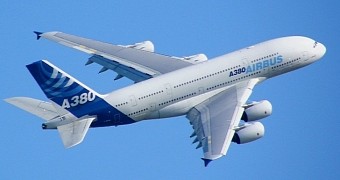The air transport industry is expected to really take off in the years to come. The bad news is that this increase in the popularity of air travel will likely go hand in hand with an increase in the amount of pollution caused by the global aircraft fleet.
Then again, there is also some good news. By the looks of it, Airbus is well aware of this problem, and is now busy trying to come up with ways to improve on the ecological footprint of planes flying over various parts of the globe.
Word has it that Airbus is looking to fit planes with hydrogen fuel cells. Specifically, the company hopes that such cells will one day take the place of engines currently used to generate onboard electrical current and heat when an aircraft is on the ground.
As detailed by Green Car Congress, the small gas turbine engines that Airbus hopes that the air transport industry will move to phase out in the not-so-distant future are dubbed Auxiliary Power Units (APUs, for short). Such engines not only release harmful emissions, but also produce quite a lot of noise.
Should aircraft of the future be fitted with hydrogen fuel cells rather than such Auxiliary Power Units, the switch would not only help limit climate change and global warming by reducing air travel-related emissions, but would also benefit wildlife by reducing noise pollution.
What's more, Airbus argues that, because they are considerably lighter than Auxiliary Power Units, hydrogen fuel cells have high chances to also help reduce the weight of aircraft. This is expected to translate into reduced fuel consumption, and consequently, into reduced emissions during flight.
It is estimated that, in this day and age, the global demand for air travel is doubling once every 15 years. To accommodate for this increase in air transport demand, some 30,000 new aircraft will have to be added to the world's fleet by the year 2032. Should these planes be fitted with hydrogen fuel cells rather than traditional gas engine turbines, overall emissions are likely to drop to a considerable extent.
Mind you, Airbus is not itself researching the possibility of having hydrogen fuel cells replace Auxiliary Power Units. On the contrary, it is experts with Hydrogen South Africa (HySA) Systems who are expected to do all the heavy lifting. Airbus, together with South Africa’s National Aerospace Centre, is to jointly fund this 3-year research project.

 14 DAY TRIAL //
14 DAY TRIAL //